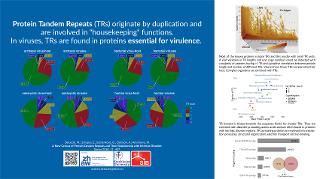Bitte benutzen Sie diese Kennung, um auf die Ressource zu verweisen:
https://doi.org/10.21256/zhaw-20159| Publikationstyp: | Konferenz: Poster |
| Art der Begutachtung: | Keine Begutachtung |
| Titel: | A new census of protein tandem repeats and their relationship with intrinsic disorder room |
| Autor/-in: | Delucchi, Matteo |
| et. al: | No |
| DOI: | 10.3390/genes11040407 10.21256/zhaw-20159 |
| Erschienen in: | Genes |
| Band(Heft): | 11 |
| Heft: | 4 |
| Seite(n): | 407 |
| Angaben zur Konferenz: | SIB Days 2020, virtual conference, 8-10 June 2020 |
| Erscheinungsdatum: | 9-Jun-2020 |
| Verlag / Hrsg. Institution: | ZHAW Zürcher Hochschule für Angewandte Wissenschaften |
| Sprache: | Englisch |
| Schlagwörter: | Tandem repeat; Homorepeat; Domain repeat; Protein repeat; Repeat prediction; Intrinsic disorder; Protein function; Swiss-Prot |
| Fachgebiet (DDC): | 572: Biochemie |
| Zusammenfassung: | Protein tandem repeats (TRs) are often associated with immunity-related functions and diseases. Since that last census of protein TRs in 1999, the number of curated proteins increased more than seven-fold and new TR prediction methods were published. TRs appear to be enriched with intrinsic disorder and vice versa. The significance and the biological reasons for this association are unknown. Here, we characterize protein TRs across all kingdoms of life and their overlap with intrinsic disorder in unprecedented detail. Using state-of-the-art prediction methods, we estimate that 50.9% of proteins contain at least one TR, often located at the sequence flanks. Positive linear correlation between the proportion of TRs and the protein length was observed universally, with Eukaryotes in general having more TRs, but when the difference in length is taken into account the difference is quite small. TRs were enriched with disorder promoting amino acids and were inside intrinsically disordered regions. Many such TRs were homorepeats. Our results support that TRs mostly originate by duplication and are involved in essential functions such as transcription processes, structural organization, electron transport and iron-binding. In viruses, TRs are found in proteins essential for virulence. |
| URI: | https://digitalcollection.zhaw.ch/handle/11475/20159 |
| Volltext Version: | Publizierte Version |
| Lizenz (gemäss Verlagsvertrag): | CC BY 4.0: Namensnennung 4.0 International |
| Departement: | Life Sciences und Facility Management |
| Organisationseinheit: | Institut für Computational Life Sciences (ICLS) |
| Publiziert im Rahmen des ZHAW-Projekts: | EU MSCA REFRACT: Repeat protein Function, Refinement, Annotation and Classification of Topologies |
| Enthalten in den Sammlungen: | Publikationen Life Sciences und Facility Management |
Dateien zu dieser Ressource:
| Datei | Beschreibung | Größe | Format | |
|---|---|---|---|---|
| 2020_Delucchi_SIB-Days_Poster.png | 3.86 MB | image/png |  Öffnen/Anzeigen |
Zur Langanzeige
Delucchi, M. (2020). A new census of protein tandem repeats and their relationship with intrinsic disorder room [Conference poster]. Genes, 11(4), 407. https://doi.org/10.3390/genes11040407
Delucchi, M. (2020) ‘A new census of protein tandem repeats and their relationship with intrinsic disorder room’, in Genes. ZHAW Zürcher Hochschule für Angewandte Wissenschaften, p. 407. Available at: https://doi.org/10.3390/genes11040407.
M. Delucchi, “A new census of protein tandem repeats and their relationship with intrinsic disorder room,” in Genes, Jun. 2020, vol. 11, no. 4, p. 407. doi: 10.3390/genes11040407.
DELUCCHI, Matteo, 2020. A new census of protein tandem repeats and their relationship with intrinsic disorder room. In: Genes. Conference poster. ZHAW Zürcher Hochschule für Angewandte Wissenschaften. 9 Juni 2020. S. 407
Delucchi, Matteo. 2020. “A New Census of Protein Tandem Repeats and Their Relationship with Intrinsic Disorder Room.” Conference poster. In Genes, 11:407. ZHAW Zürcher Hochschule für Angewandte Wissenschaften. https://doi.org/10.3390/genes11040407.
Delucchi, Matteo. “A New Census of Protein Tandem Repeats and Their Relationship with Intrinsic Disorder Room.” Genes, vol. 11, no. 4, ZHAW Zürcher Hochschule für Angewandte Wissenschaften, 2020, p. 407, https://doi.org/10.3390/genes11040407.
Alle Ressourcen in diesem Repository sind urheberrechtlich geschützt, soweit nicht anderweitig angezeigt.